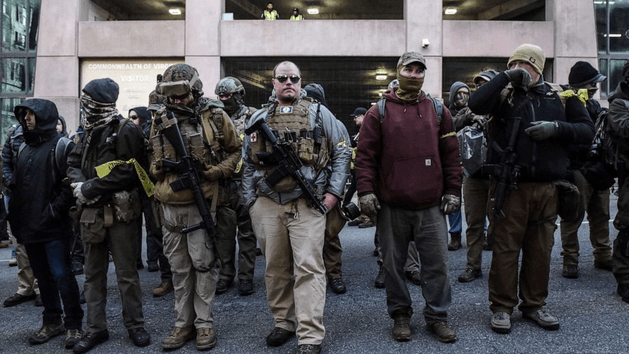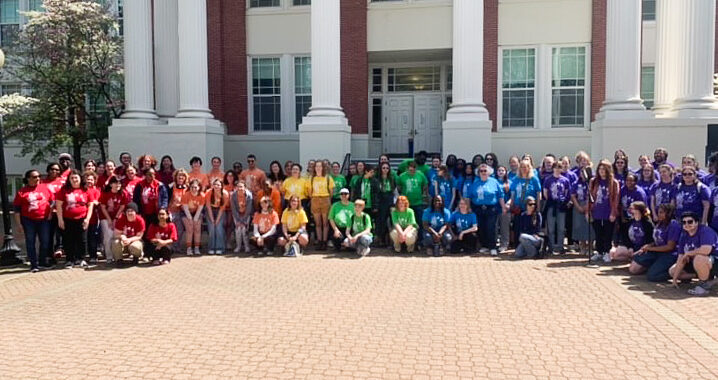Campus opinion split on new Virginia gun laws
4 min read
Following last semester's gun threat, the idea of an open carry campus appeals to some students. (ABC News)
by KAITLYN O’GORMAN
Staff Writer
On Jan. 17, the Virginia Senate passed three bills which sparked immediate tension not only throughout Virginia, but across the country. These bills will allow localities to ban guns in public spaces, limit consumers to one handgun purchase per month, and require universal background checks on gun sales. The “red flag” law, which will allow authorities to temporarily confiscate firearms from anyone that is deemed dangerous to themselves or others, was still being proposed at this time.
To protest increased gun control, an estimated 22,000 pro-gun activists rallied while openly carrying in Richmond on Jan. 20. The shared fear amongst the protesters on that day was that these bills are a slippery slope towards the government taking away their constitutional rights.
Despite the protesters’ efforts, the Virginia Senate passed the “red flag” law on Jan. 22.
For some students, Virginia’s previous gun control laws were sufficient.
Emily McPhee, a communications and digital studies major, spoke in support of law-abiding citizens owning guns.
“A lot of my family is in the military and my step-dad is a police officer so guns were very normal for me growing up, but a lot of people think that guns are dangerous and that we should regulate them more,” said McPhee. “It definitely makes sense for there to be some sort of regulation, but I also understand that people break laws all the time, so what’s going to stop them from getting guns even if we create more laws regulating them.”
Patricia Puccetti, a senior psychology major, is also against increased gun control. “The new gun control laws are allegedly driven by the Virginia Beach shooting. But [most of] the new laws would not have prevented that shooting. The reality is that gun control laws do not prevent shootings. A murderer is inherently a criminal and will not obey laws,” said Puccetti.
Other students support the legislation from Richmond and hope that it will create a safer state and more educated citizens.
Maddox Robinson, a senior psychology major, said, “I saw some clips from the Richmond demonstration and I saw one guy holding what looked like an assault rifle with the muzzle balanced on his foot and I just thought ‘yeah, I think we do need stronger regulations and part of that should be that you need to know how to use a gun.”
The gun debate hits close to home for UMW students, where just last semester they experienced a gun threat, despite the campus having a strictly enforced gun policy. Even though the threat ended up being noncredible, during the potential crisis students, professors and staff were instructed to ‘shelter in place’ while authorities took care of the situation.
Although sheltering in place is a simple and straight forward plan, there was a good deal of confusion.
“I found out that there was an active shooter action plan through one of my professors and not through official communication from the school. Which I think speaks towards the way the school prepares its students more than the plan itself,” said Robinson.
Guidelines for an active shooter situation are available on the UMW Police and Public Safety website.
“There was a clear shelter in place alert but there was a professor telling students that there wasn’t a shooter on campus and to go home… but [they] don’t know that and [they] don’t have the authority to just tell people to leave,” stated McPhee.
In reaction to the disarray of the gun threat, one student suggested the University allow carrying of firearms on campus for self protection.
“UMW police officers are carrying the standard sidearm… but I don’t see officers very often…In order to reduce the casualties of a shooting you need to cut down the response time,” said sophomore physics major Logan Palmer. “The best way to do that is by allowing people to be armed themselves. Shooters aren’t going to go somewhere where everyone has a gun, they’re going to go somewhere where there are signs that say ‘No firearms allowed on campus’… If there were signs stating that ‘staff is highly armed and will use lethal force to protect students,’ [a potential shooter] might think twice.”
Puccetti also felt this would be beneficial due to the time it takes for law enforcement and security personnel to respond to the crisis. “Minutes without a good guy with a gun in a crisis usually has catastrophic results,” said Puccetti.
There are additional resources on campus that allow students to help prevent crises from happening and protect themselves by having the proper knowledge and a good level of awareness.
The Firearms Club hosts a variety of free public safety courses every semester. Last semester these included an Active Shooter Prevention Program hosted by Jody Maki of GirlOnFire, and an iteration of the Refuse To Be a Victim seminar, both of which will aim to teach attendees how to be safe and alert in a variety of situations.
Adam Cooper, a senior English major, feels that the university is safe as is. “In a college campus setting, guns aren’t really necessary… I don’t see the need to carry a weapon [on campus].”
Following the recent legislation from Richmond and the gun threat on campus last semester, student opinion, like the rest of the state, is split on how best to approach fair solutions to gun violence.











